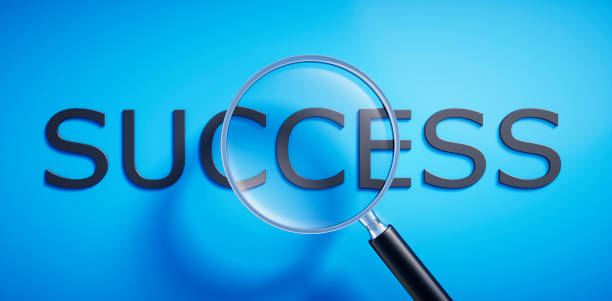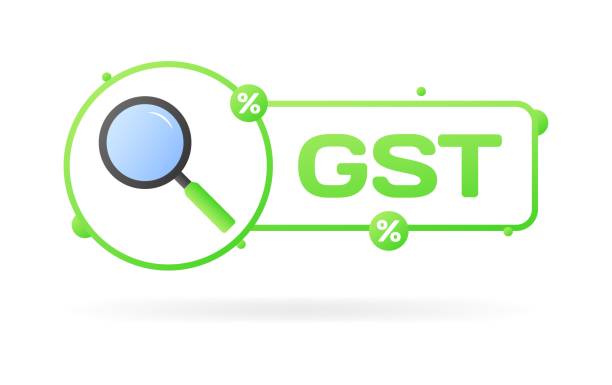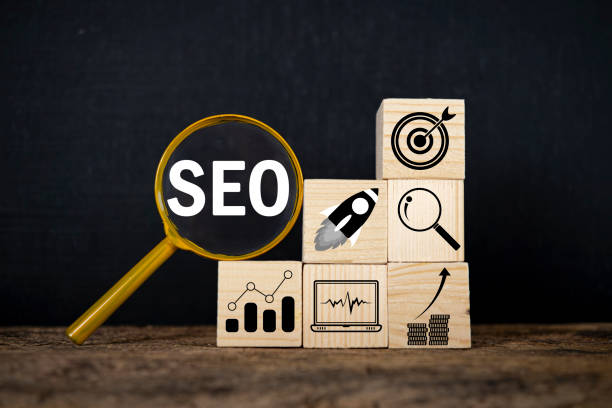Introduction to SEO and its Importance

In today’s highly competitive world, an online presence is vital for every business and individual.
However, merely having a website or a social media page is not enough; visibility is the most important challenge.
This is where the concept of #SEO or #Search_Engine_Optimization becomes important.
#SEO is a set of techniques and strategies aimed at improving a website’s ranking in organic search results of engines like Google.
This process goes beyond simply placing a few keywords and requires a deep understanding of how search engine algorithms work.
The main goal of SEO is to increase quality traffic to your website, meaning users who are looking for the products, services, or information you provide are directed to your site.
It is a continuous and dynamic educational process that requires updating knowledge and strategies.
For success in the digital space, understanding and applying SEO principles is unavoidable and can significantly increase your business’s profitability and visibility.
In fact, SEO is no longer an option; it’s a necessity.
This article provides a comprehensive explanation of the various aspects of SEO and helps you gain a better understanding of this complex yet fascinating field.
Did you know that your company’s website is the first point of contact for 75% of potential customers?
Your website is the face of your brand. With **Rasabweb**’s corporate website design services, build an online presence that attracts customer trust.
✅ Create a professional and lasting image for your brand
✅ Attract target customers and increase online credibility
⚡ Get a free consultation from **Rasabweb** experts!
Types of SEO and Their Differences

To fully understand the broad scope of SEO, it is essential to become familiar with its main categories.
Generally, SEO is divided into three main sections: On-Page SEO, Off-Page SEO, and Technical SEO.
Each of these categories addresses different aspects of a website, and to achieve high rankings in search engines, special attention must be paid to all three areas.
On-Page SEO refers to all optimizations performed within the website itself; including optimizing keywords, titles, meta descriptions, text content, images, and URL structure.
This section directly relates to the quality and relevance of the page content for both the user and the search engine.
Off-Page SEO, as its name suggests, refers to activities performed outside of your website to increase its authority and popularity.
The most important factor in Off-Page SEO is Backlinks; these are links from other websites to your site.
The quality and authority of the linking websites play a significant role in the power of these backlinks.
Activity on social media, content marketing, and online public relations also fall into this category.
Finally, Technical SEO focuses on optimizing the technical aspects of a website so that search engines can easily crawl and index your site.
This includes site loading speed, mobile compatibility, site structure, Robots.txt and Sitemap.xml files, Schema Markup, and SSL certificates.
This area is specialized and requires strong technical knowledge.
The overlap of these three sections and their coordinated work is what forms a successful SEO strategy.
Without attention to each of these sections, achieving desired SEO results will be difficult.
Keyword Research, the Cornerstone of Any SEO Strategy

Keyword research is one of the first and most important steps in any SEO strategy.
This process helps you identify the phrases and words your target audience uses in search engines to find products, services, or information similar to what you offer.
Understanding the User Intent behind each keyword is of paramount importance.
Is the user looking for information (informational keywords), intending to buy (commercial keywords), or seeking a specific website (navigational keywords)? Answering these questions determines the type of content you should produce and helps you implement targeted SEO.
Various tools like Google Keyword Planner, Ahrefs, SEMrush, and KWFinder can assist you in this process.
After identifying relevant keywords, you should categorize and prioritize them based on search volume, competition level, and relevance to your business.
Focusing on “long-tail keywords,” which are longer and more specific phrases, can attract more targeted traffic to your site because they have less competition and clearer user intent.
For example, instead of “shoes,” you can use “waterproof men’s running shoes.”
This is a key guidance for SEO.
Below, a table is provided to display the types of keywords and their characteristics, which can offer a better explanatory and educational insight.
This table helps you optimize your keyword strategy and create a strong foundation for your site’s SEO.
| Keyword Type | User Intent | Example | Characteristics |
|---|---|---|---|
| Informational | Searching for information, learning | “What is SEO?” “How to do SEO?” | High search volume, low purchase intent, suitable for blogs and articles |
| Navigational | Accessing a specific site or page | “Digikala” “Google account login” | Specific goal, high traffic for brands, needs brand optimization |
| Commercial Investigation | Research before purchase, product comparison | “Best Samsung phone” “Asus vs Lenovo laptop comparison” | High purchase intent, medium competition, suitable for product and comparison pages |
| Transactional | Ready to buy, book, download | “Buy airplane ticket” “Download graphic software” | Very high purchase intent, high competition, suitable for product and service pages |
Quality Content and its Role in SEO Improvement

After keyword research, the next step is to produce content that is not only optimized for search engines but also engaging and valuable for users.
Content is the heart of every successful SEO strategy.
Search engines are increasingly focusing on the quality and relevance of content to user intent.
Quality content is content that meets users’ needs, answers their questions, and provides accurate and comprehensive information.
This type of content can include blog posts, product pages, videos, infographics, podcasts, and even interactive tools.
To optimize content for SEO, target keywords should be used naturally and without overstuffing in the text.
Additionally, content structure (using headings and subheadings, lists, short paragraphs), text readability, and image optimization (using Alt tags and compressing size) are also of high importance.
Content that is question-provoking or content that answers user problems often achieves better search results.
Search engines give higher scores to content that has sufficient depth and addresses a topic from various angles.
This also includes analytical and specialized content that provides deeper insights.
Regularly updating old content and adding new content not only shows search engines that your site is active but can also increase returning traffic.
Finally, user experience (UX) also plays a significant role in content quality; if users cannot easily consume your content or your site’s navigation is complex, their likelihood of returning decreases, which indirectly affects SEO.
Disappointed with your e-commerce site’s low conversion rate? Rasabweb transforms your online store into a powerful tool for attracting and converting customers!
✅ Significant increase in visitor-to-customer conversion rate
✅ Exceptional user experience to boost customer satisfaction and loyalty⚡ Act now for a free consultation!
Technical SEO: Technical Optimization for Search Engines

Technical SEO is the backbone of any website, ensuring that search engines can easily crawl, index, and understand your website.
This aspect of SEO primarily focuses on improving the site’s technical structure and is less directly related to content or link building, but it plays a vital role in website visibility.
Page loading speed is one of the most important factors for technical SEO.
Both users and search engines prefer fast pages.
Tools like Google PageSpeed Insights can help identify and resolve speed issues.
Mobile compatibility is also highly important, as a large portion of searches are conducted via mobile devices.
A website that is not responsive and does not display correctly on mobile devices not only creates a poor user experience but is also penalized by Google.
Other important factors include using an SSL certificate for site security (HTTPS), an SEO-friendly URL structure, the presence of a Robots.txt file to guide crawlers, and a Sitemap.xml to help pages get indexed.
Schema Markup is also a specialized code that helps search engines better understand page content and can lead to the display of “Rich Snippets” in search results, which have greater visual appeal.
This part of SEO requires specialized knowledge and often needs to be performed by web developers.
Proper technical SEO ensures that all your efforts in on-page and off-page SEO bear fruit.
Backlink Building and Domain Authority in Off-Page SEO

Off-Page SEO refers to all activities performed outside of your website with the aim of improving its authority and ranking in search results.
Among these, backlink building, or link building, is the most important and at the same time most challenging part of off-page SEO.
A backlink is a link from another website to your site, and it is considered by search engines as a “vote of confidence” or “referral” from that website.
The greater the number and quality of linking websites, the higher your Domain Authority will be.
The quality of backlinks is more important than their quantity.
A backlink from an authoritative website relevant to your field of activity is worth much more than several backlinks from low-authority and irrelevant sites.
Backlink building strategies include producing valuable and shareable content, connecting with bloggers and influencers, engaging on social media, guest posting on other sites, and broken link building.
All these activities require an analytical approach and proper guidance.
The term “Anchor Text,” or the text on which a link is placed, also plays an important role in SEO.
Using diverse anchor texts relevant to the target keyword helps search engines better understand the topic of the linked page.
Backlink building is a time-consuming and ongoing process that requires patience and effort.
However, its impact on SEO rankings is undeniable and helps you stay ahead in the competitive online space.
Local SEO and its Importance for Physical Businesses

Local SEO is a subset of SEO that focuses on optimizing a business’s online presence for local searches.
This type of SEO is particularly important for businesses with a physical location, such as restaurants, stores, clinics, and service providers in a specific area.
The main goal of local SEO is to ensure that your business appears in search results for users near your physical location or those looking for services in a specific area.
The most important tool for local SEO is the Google My Business (GMB) profile.
Fully optimizing this profile, including adding accurate and complete business information (name, address, phone number, business hours), high-quality photos, attractive descriptions, and responding to customer reviews, can significantly impact your visibility on Google Maps and in local search results.
Earning positive customer reviews is also a crucial ranking factor in local SEO.
Encouraging customers to share their experiences can increase your business’s credibility and trust.
In addition to GMB, other important local SEO factors include mobile-friendliness of the website, consistent mention of the business’s Name, Address, and Phone number (NAP) across the website and online directories, and creating relevant local content (e.g., blog posts about local events or specific regional services).
This is a type of guidance for physical businesses that want to benefit from SEO.
Below is a table showing the key factors influencing local SEO.
This information is news of the importance of this field.
| Local SEO Factor | Description | Importance |
|---|---|---|
| Google My Business (GMB) Profile | Accurate info, photos, posts, review responses | Very high, foundation of local visibility |
| Customer Reviews and Ratings | Quantity and quality of reviews on GMB and other platforms | High, increases trust and ranking |
| NAP Consistency (Name, Address, Phone) | Consistent business info across all directories and websites | High, for business identity verification |
| User Behavioral Signals | Clicks on search results, phone calls, direction requests | Medium to high, indicates user engagement |
| Local Website Optimization | Local keywords in content, titles, meta descriptions, site speed | High, complements GMB and directories |
Data Analysis and SEO Tools

Without measurement and analysis, you cannot understand how effective your SEO strategy is and which areas need improvement.
Data analysis is a critical aspect of SEO that allows you to track your website’s performance, identify problems, and discover new opportunities.
There are numerous tools available for this purpose, each offering unique capabilities.
Google Analytics and Google Search Console are two free and essential tools from Google that should be used by every webmaster.
Google Analytics provides you with detailed information about user behavior on your website, including the number of visitors, time spent on the site, popular pages, and the paths users take.
Google Search Console also provides vital information about how your site appears in search results; keywords users used to find your site, crawl errors, backlinks, and page indexing status.
These tools are an unparalleled educational and analytical resource for understanding your site’s performance in the SEO domain.
In addition to Google’s tools, there are powerful paid tools like Ahrefs and SEMrush that offer more advanced capabilities for competitor analysis, keyword research, backlink analysis, and rank monitoring.
Using these tools allows you to conduct a comprehensive and specialized analysis of your SEO status and make data-driven decisions.
These tools help you answer important questions like “What content performs better?” or “What site changes have led to rank improvement?” and pursue a data-driven SEO strategy.
Are your online sales not as you expected? With Rasabweb, solve the problem of low sales and poor user experience forever!
✅ Increase visitor-to-customer conversion rate
✅ Create an enjoyable user experience and boost customer trust⚡ Contact us now for a free consultation!
Challenges and New Trends in the World of SEO

The world of SEO is constantly changing and evolving.
Search engine algorithms are regularly updated, and new trends emerge that SEO specialists must always be aware of.
One of the most important recent trends is Artificial Intelligence (AI) and its role in search.
Google, using AI (such as the RankBrain and MUM algorithms), strives to better understand users’ true intent and display more relevant results.
This means that content should focus more on answering complex questions and providing comprehensive information.
Voice Search has also become an important trend due to the widespread use of voice assistants like Siri, Google Assistant, and Alexa.
Optimizing for voice search includes focusing on conversational keywords and directly answering questions.
Core Web Vitals is also a set of user experience factors introduced by Google, which include loading speed, interactivity, and visual stability of the page.
Improving these metrics is crucial for SEO ranking.
This section of the article is news of the latest developments.
The concept of E-A-T (Expertise, Authoritativeness, Trustworthiness), which refers to the expertise, authority, and trustworthiness of content, has also gained increasing importance, especially for websites in the health and financial sectors.
Producing specialized content by experts and referencing reliable sources can increase your site’s E-A-T score.
These changes have transformed SEO into an engaging yet complex field that requires continuous updating of knowledge and analytical approaches.
Conclusion and the Future of SEO

Throughout this article, we covered various aspects of SEO, from its introduction and importance to its types, keyword research, content creation, technical SEO, backlink building, local SEO, data analysis, and new trends.
SEO is a comprehensive and dynamic process that requires continuous effort and smart strategies.
Simply following a few simple tips cannot achieve lasting results; rather, all aspects of SEO must be optimized harmoniously and continuously.
The future of SEO is increasingly moving towards a deeper understanding of user intent, user experience, and the use of artificial intelligence.
Search engines are becoming smarter and think more like humans.
This means that focusing on producing high-quality and valuable content for users, improving user experience on the site, and building online credibility will become even more important.
For businesses looking for long-term success in the online space, investing in SEO is an essential choice.
SEO is not just about achieving high rankings, but about creating a strong and sustainable foundation for your online presence that brings targeted traffic, loyal customers, and ultimately, business growth.
This article was a comprehensive guide to help you find your way in the complex yet rewarding world of SEO.
By following these guidelines and staying updated with the latest changes, you can leverage the power of SEO to achieve your digital goals.
Frequently Asked Questions
| Question | Answer |
|---|---|
| What is SEO? | SEO, or Search Engine Optimization, is the process of increasing the quality and quantity of website traffic by improving the site’s ranking in organic search results of search engines like Google. |
| What are the main types of SEO? | SEO is divided into three main categories: On-Page SEO, Off-Page SEO, and Technical SEO. |
| What does On-Page SEO include? | On-Page SEO includes optimizing elements within the website, such as keywords, Title Tag, Meta Description, content, URL structure, images, and internal links. |
| What is Off-Page SEO? | Off-Page SEO refers to activities outside the website that help improve its ranking, such as Backlink Building, social media marketing, and Brand Mentions. |
| What is Technical SEO? | Technical SEO focuses on optimizing the technical aspects of a website to help it be better crawled and indexed by search engines. This includes site speed, mobile-friendliness, site structure, Sitemaps, and Robots.txt file. |
| What role do Keywords play in SEO? | Keywords are phrases that users enter into search engines. Proper and targeted use of relevant keywords in content and site elements helps search engines understand your page’s topic and display it for relevant searches. |
| What is a Backlink and why is it important? | A backlink, or inbound link, is a link from one website to another. Backlinks act as a “vote of confidence” from other sites for search engines and play a significant role in a site’s authority and ranking increase, especially if they are from reputable sites. |
| What is the impact of quality content on SEO? | Quality, relevant, comprehensive, and unique content not only attracts and retains users but also signals to search engines that your page is valuable. This helps improve rankings, reduce Bounce Rate, and increase user time on site. |
| Why is site loading speed important for SEO? | Site loading speed is an important ranking factor for Google. Faster sites offer a better user experience, have lower bounce rates, and are preferred by search engines. |
| Is SEO a one-time process? | No, SEO is an ongoing and long-term process. Search engine algorithms are constantly changing, competition is increasing, and site content also needs updating. Therefore, SEO requires continuous monitoring, analysis, and optimization. |
And other advertising services by Rasabweb Advertising Agency:
Smart UI/UX: A specialized service for improving SEO ranking based on marketing automation.
Smart Advertising Campaign: A specialized service for boosting user engagement based on user experience customization.
Smart Marketing Automation: Designed for businesses seeking customer acquisition through SEO-driven content strategy.
Smart Customer Journey Mapping: Revolutionize campaign management with intelligent data analysis.
Smart Marketing Automation: Transform customer acquisition by optimizing key pages.
And over a hundred other services in the field of internet advertising, advertising consulting, and organizational solutions.
Internet Advertising | Advertising Strategy | Advertorials
Sources
The Importance of SEO in Digital Marketing
Comprehensive SEO Guide for Digital Success
What is SEO and why is it vital for your business?
SEO Strategy: A Big Step Towards Online Success
? For your business to leap forward in the digital world and reach the pinnacle of success, Rasabweb Afarin Digital Marketing Agency, with expertise in e-commerce website design and comprehensive marketing strategies, is with you to experience a powerful and profitable presence.
📍 Tehran, Mirdamad Street, next to Bank Markazi, Southern Kazeroon Alley, Ramin Alley, No. 6




